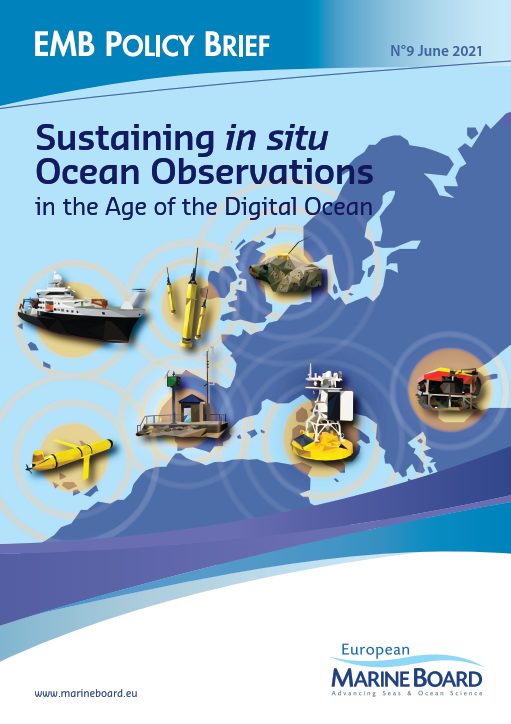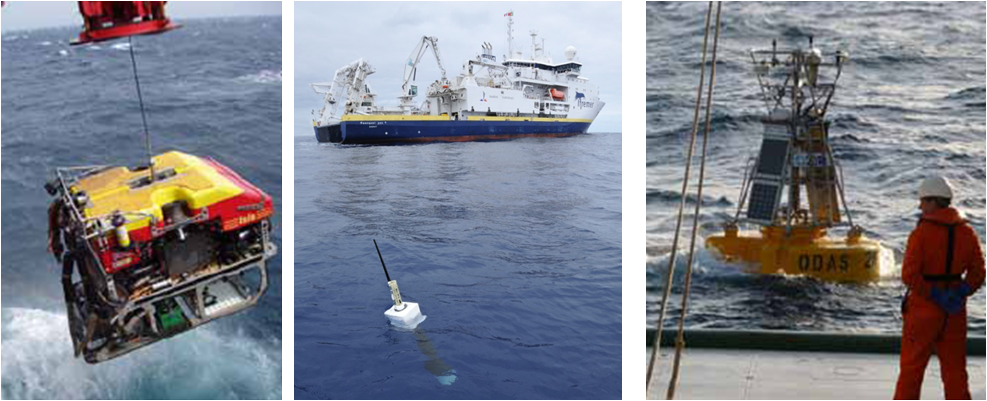Output
 The final output for this working group is the EMB Policy Brief No. 9 'Sustaining in situ Ocean Observations in the Age of the Digital Ocean' launched at the EMODnet Open Conference 2021 on 16 June 2021. On Thursday 17 June 2021, EMB hosted its tenth Science Lunch Webinar on this Policy Brief, presented by Prof. Edward Hill, one of the co-authors. Several document co-authors have also made short videos discussing the messages in the document. You can view these on the EMB YouTube Channel.
The final output for this working group is the EMB Policy Brief No. 9 'Sustaining in situ Ocean Observations in the Age of the Digital Ocean' launched at the EMODnet Open Conference 2021 on 16 June 2021. On Thursday 17 June 2021, EMB hosted its tenth Science Lunch Webinar on this Policy Brief, presented by Prof. Edward Hill, one of the co-authors. Several document co-authors have also made short videos discussing the messages in the document. You can view these on the EMB YouTube Channel.
Download the EMB Policy Brief No.9 here.
Background
 The ocean environment is in growing demand for human use as land-based resources are depleted or become less secure. However, the marine environment is undergoing unprecedented change and is subject to cumulative stressors – climate change, pollution, destruction of habitats, over-exploitation, all compounded by strong cycles of natural variability.
The ocean environment is in growing demand for human use as land-based resources are depleted or become less secure. However, the marine environment is undergoing unprecedented change and is subject to cumulative stressors – climate change, pollution, destruction of habitats, over-exploitation, all compounded by strong cycles of natural variability.
Continuous, globally distributed, combined satellite and ‘in-water’ observational infrastructures for Essential Ocean Variables (EOV's), analysis and interpretations are now becoming a real possibility due to transformative technologies (e.g. robotics, autonomy, micro-sensors, big data, artificial intelligence) for ‘in water’ measurements especially. Developed satellite observing infrastructure giving near global spatial coverage have been available for several years – but they mostly measure only a few parameters in the thin surface layer at intervals of several days. The ‘in-water’ (‘in situ’) part of the ocean observing system is therefore critical and acceleration of its development and implementation is needed. However, commitments to funding satellite vs in situ ocean observations are disproportionate. Currently, only ~ 30% of in situ ocean observations have sustained funding, against the 72% of atmospheric observations which are supported by core institutional funding (Buch et al. 2019), and there are limited mechanisms available to access medium (3-5 years) to long (6-10) term funding.
On the occasion of the onset of the UN Decade of Ocean Science for Sustainable Development in 2021, ongoing discussions on the European Ocean Observation System Framework (EOOS) on the sustainability of ocean observations, advances in the G7 Future of the Seas and Oceans initiative, and the proposal for an act from the European Commission on Ocean Observation, the EMB Policy Brief will focus on funding in situ ocean observing.
This working group provides input to the UN Decade of Ocean Science for Sustainable Development (2021-2030) societal outcome that aims for a transparent and accessible ocean.
Objectives
The aim of this Working Group is to produce a short Policy Brief highlighting resourcing, governance and benefits of Ocean Observations at national, European and Global level, and current gaps in sustained funding for ocean observations, while providing recommendations to overcome these gaps.
Terms of Reference
At the Autumn 2020 Plenary meeting of the European Marine Board, the proposal was made for developing a policy brief with a reduced number of experts by summer 2021 on sustainable funding for ocean observations. The Board considered this topic as timely and a bypass process was approved to set up working group faster than the regular procedure, under the leadership of the EMB Executive Director, and with the supervision of the EMB Executive Committee.
Members
Chair: Sheila Heymans, EMB Executive Director
Working group members:
Ed Hill, NOC – National Oceanography Centre, UK
Katy Hill, G7 Future of the Seas and Oceans Coordination Unit, NOC, UK
Maria Hood, G7 Future of the Seas and Oceans Coordination Unit, Mercator Ocean, France
Pierre-Yves Le Traon, CMEMS - Copernicus Marine Environment Monitoring Service, Mercator Ocean, France
George Petihakis, EuroGOOS & JPI Oceans, HCMR, Greece
Martin Visbeck, GEOMAR Helmholtz Centre, Germany
Contact at European Marine Board Secretariat: Sheila Heymans Email and Ángel Muñiz Piniella Email